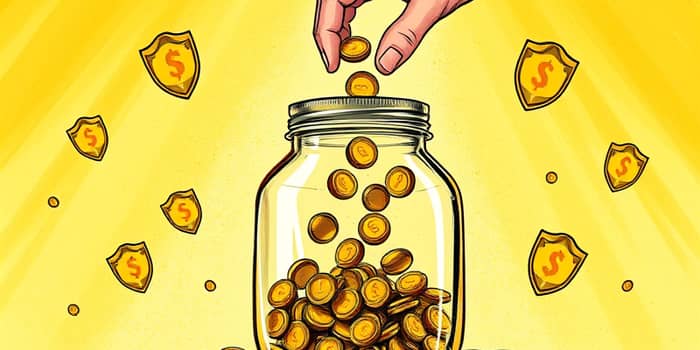
Every day, millions of families face unexpected expenses—car repairs, medical bills, or sudden job loss. In those critical moments, the lure of a quick cash infusion from payday lenders can seem like a lifeline. Yet triple-digit annual percentage rates and hidden fees often trap borrowers in a cycle of unending debt. The true cost of these high-interest loans extends far beyond the initial amount borrowed, risking long-term financial stability and peace of mind.
Consider the story of Maria, a single parent who discovered a surprise medical bill on her doorstep. With rent due and groceries needed, she felt trapped. A payday lender promised quick relief, but within weeks, her debt had doubled. This is a story all too common across communities. Yet by adopting a proactive approach to saving, these hardships can be faced head-on without succumbing to predatory lenders.
Payday loans advertise easy approval and fast funding, but borrowers pay a steep price. With average interest rates nearing 400 percent, even a small advance can balloon into large, unmanageable obligations. After the first loan term ends, many borrowers lack the funds to repay on time and must roll over the balance, incurring additional fees and compounding interest.
Research shows that repeated borrowing is common: roughly 70 percent of payday loan customers take out more than one loan within a single year. This rapid cycle of debt and fees can lead to missed rent payments, revoked bank accounts, and damaged credit scores. The stress of looming debt can force difficult choices, like delaying essential medical care or cutting corners on basic living expenses—all to avoid defaulting on a high-cost loan.
The emotional toll of payday lending goes beyond your wallet. Anxiety can seep into relationships, affecting family and work performance. When finances dictate every decision, stress becomes a constant companion, undermining self-worth and eroding confidence. This hidden burden highlights why avoiding these loans is essential not just for economic health, but for our overall well-being.
Developing an emergency fund is the most powerful strategy for steering clear of payday lenders. Experts recommend saving three to six months' worth of living expenses to cover unexpected costs or income disruptions. For the average American household, this equates to roughly $35,000 set aside in a readily accessible account.
Unfortunately, the median savings balance in the United States is only about $8,742. That shortfall leaves many households vulnerable. By prioritizing consistent contributions to an emergency fund, you can create a financial cushion that absorbs life’s sudden shocks without resorting to predatory credit.
Knowing why you save is as important as knowing how much. A clear vision—whether it’s covering an unexpected car repair or ensuring rent payment—fuels motivation. Visualizing your goal, like marking progress on a chart or using a savings thermometer, transforms abstract numbers into tangible achievements.
Modern technology can accelerate your progress. Budgeting apps that sync with bank accounts categorize spending automatically, helping pinpoint leaks. Round-up features transfer spare change into your fund, while goal trackers send alerts when you near milestones. By integrating these tools into your financial routine, you turn saving from a chore into an engaging challenge.
To kickstart your savings journey, follow simple, realistic steps that align with your financial situation.
When an unforeseen expense arises and your fund isn’t yet fully established, consider lower-cost solutions. Community agencies and nonprofit charities often offer emergency financial assistance without exorbitant fees. Many employers provide interest-free or low-interest pay advances, allowing workers to access a portion of their paycheck before payday.
Another option is borrowing from family or close friends. Though it might feel awkward, setting clear terms in writing can protect relationships and avoid misunderstandings. Additionally, nonprofit credit counseling agencies deliver free budget coaching and help you explore debt-management plans that replace high-cost loans with sustainable payment schedules.
Credit unions often offer small-dollar, fixed-rate loans that comply with federal guidelines, meaning APRs below 36 percent and clear repayment schedules. These products are designed to help members bridge short-term gaps without long-term repercussions. Investigate local credit unions for membership requirements—they often serve specific communities or employers but may welcome anyone in the region.
By selecting these alternatives over payday lenders, you preserve cash flow and maintain control of your finances during difficult periods.
Understanding the mechanics and risks of payday lending is only the first step. True financial resilience comes from adopting habits that reinforce stability and foresight. Begin by mapping out your monthly budget in detail, identifying areas where small adjustments can free up cash for savings.
Forming a support network can amplify your commitment. Engage friends or coworkers in a savings challenge, sharing tips and celebrating each milestone. Accountability partners offer encouragement when temptation strikes, and the friendly competition boosts morale. Together, you reinforce positive habits and reduce the isolation that often accompanies financial struggles.
Over time, these practices become second nature. As your emergency fund grows, you gain peace of mind and financial freedom, confident in your ability to handle life’s surprises without succumbing to predatory borrowing. By planning ahead and leveraging community resources, you sidestep the pitfalls of payday lenders and set the stage for long-term prosperity.
Ultimately, financial resilience is a journey, not a destination. Every dollar saved, every alternative solution explored, and every mindset shift chips away at the influence of predatory lenders. By weaving these practices into daily life, you gain mastery over your finances and ensure that unexpected expenses become manageable hurdles, not insurmountable barriers.
You are the architect of your financial future. Prioritize emergency savings, explore cost-effective borrowing alternatives, and cultivate disciplined spending habits. In doing so, you not only shield yourself from high-interest debt but also lay the groundwork for a more secure, empowered, and peaceful life.
References













